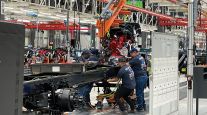Senior Reporter
Traton Group Reports Big Revenue Gains in First Half

[Stay on top of transportation news: Get TTNews in your inbox.]
Navistar parent company Traton Group in July reported strong operating results and revenue for the first half of 2022, despite what it called an extremely challenging market.
The group’s operating result for the period, reported in euros, was the equivalent of $678 million compared with $466 million a year earlier. Revenue climbed to $18.4 billion compared with $14 billion a year earlier.
Traton is based in Germany. Navistar sells International brand trucks in the United States.
Traton noted that while sales were impacted by continuing supply bottlenecks and a production stop at MAN Truck & Bus related to the war in Ukraine, unit sales for the first half of the year rose 9% to 137,300 vehicles compared with 126,450 a year earlier — including 115,115 trucks compared with 108,665 in the 2021 period. The company credited the gains to the consolidation of Navistar’s operations. Traton completed its merger with Navistar in July 2021.
In an extremely difficult #environment, the #TRATONGROUP pushed ahead with its electrification #strategy in the first half of 2022 and achieved important strategic progress.
Click here to get more information on our progress so far >> https://t.co/WlkecWcvS5#ElectricMobility — TRATON GROUP (@TRATON_GROUP) July 28, 2022
Traton said it is seeing a positive impact from its growing service business, along with the success of its strategy to increase its global footprint by entering the North American market. Navistar has a service network that includes more than 1,000 dealer locations as well as Love’s Travel Stop and Speedco service partner locations in North America.
For the first six months of this year, Navistar’s International brand notched U.S. Class 8 retail sales of 13,439, good for a 12% market share compared with 13,016 and an 11.7% share in the 2021 period, Wards Intelligence reported.
“We are dealing with a lot of major challenges,” Christian Levin, CEO of Traton Group, said in a release. “Although the availability of semiconductors and other key components is slowly improving, it has not yet returned to normal. At the same time, raw materials and energy are becoming more expensive, and logistics resources are tight. Nevertheless, our group is becoming more and more adept at handling this situation — our hard work to get there is paying off.”
Traton said it is expecting improvements in the supply of semiconductors and other key components in the second half of this year.
“Right now, we are tackling two major challenges — taking the right measures to stay on track in what remains a very challenging environment while at the same time continuing our strategy to transition to sustainable transportation,” said Traton Chief Financial Officer Annette Danielski.

Danielski
Key to the latter goal is aligning its brands’ portfolio to focus on battery electric vehicles. Production of e-trucks at its MAN brand is scheduled to start at the beginning of 2024, almost a year earlier than originally planned. In the first half of the year MAN presented a close-to-production prototype of its new electric truck in Germany for the first time. Starting in early 2025, MAN will manufacture high-voltage batteries for e-trucks and buses in large series at its site in Nuremberg, Germany. The company reported it is investing $102 million over the next five years on the project and plans to expand its production capacity to more than 100,000 batteries per year.
Plus, Traton’s joint venture with Daimler Truck and Volvo Trucks for commercial vehicle fast charging in Europe is getting underway, and aims to establish and run at least 1,700 green energy charging points in Europe over the next five years.
Traton’s Volkswagen Truck & Bus unit already has an electric vehicle on the market with its e-Delivery truck, while Navistar’s electric school bus from the CE Series “is showing what sustainable and safe mobility looks like in everyday life,” Levin said. Scania opened a battery laboratory, where up to 170 tests can be performed simultaneously for battery cells, modules and packs. It also introduced its first electric truck for regional longhaul operations.
Still, Danielski noted economic headwinds remain.
“At the same time, we are facing new challenges like the soaring inflation, rising interest rates, and logistics shortages,” she said. “The risks remain high, and the further impact of the war in Ukraine, in particular, on our business can only be estimated to a very limited extent.”
Want more news? Listen to today's daily briefing below or go here for more info:




